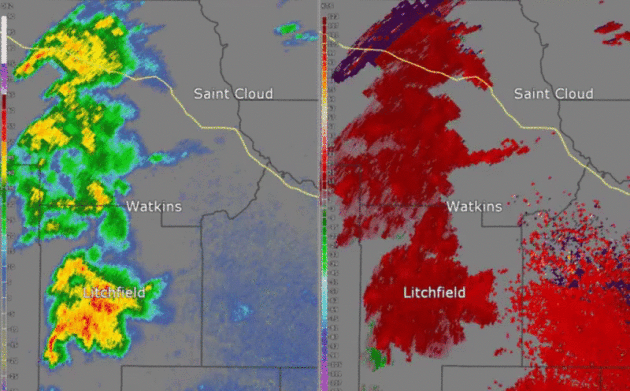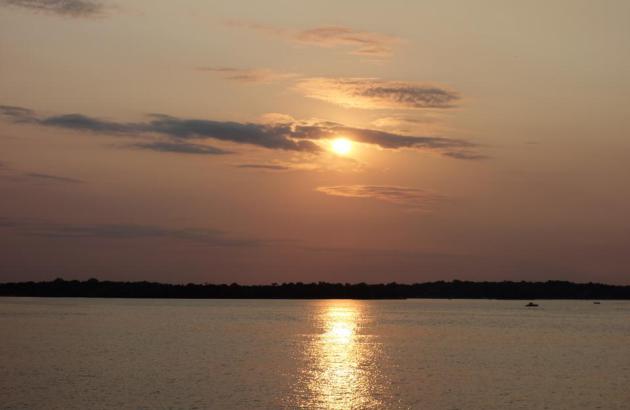80 F. high temperature yesterday in St. Cloud.
83 F. average high on July 13.
87 F. high on July 13, 2015.
July 14, 2003: At least eleven tornadoes hit Minnesota. Baseball-sized hail is reported at Indus in Koochiching County.
July 14, 1936:
The all-time record high is reported in the Twin Cities, with 108
degrees at the downtown Minneapolis office. 71 people would die in the
Twin Cities on this day due to the extreme heat.
July 14, 1916: Heavy downpours at New Ulm dump over seven inches of rain in seven hours.
Comfortable 48 Hours. Summer Sizzles Next Week"I'm
only human, born to make mistakes" sang the Human League. Ah, the 80s.
Great tune honey, but do you HAVE to make it MY
ringtone?
Meteorology is more quest than career; we are
continuously learning, tweaking, calibrating. Apologizing.
It's not an exact science - like economics or foreign policy.
It's human nature to remember the times we're wrong, not the majority of time the forecast is fairly close. It's a strange gig.
People
like to blame us for weather they don't like. Professional hazard. I'm
going to get an earful next week as Minnesota heats up, probably the
hottest spell of the summer.
A sucker punch of cool, comfortable
air today temporarily distracts us from next week's inevitable heat
wave. Highs hold in the 70s with instability showers.
Friday looks sunnier and drier, but a wave of showers and T-showers arrives late
Saturday into
Sunday morning.
Heat
builds next week; ECMWF guidance hints at mid to upper 90s the latter
half of next week - with a heat index above 100F. Seriously hot.
Panting? Howling? The Dog Days of July are showing up on the horizon.
* Photo of the digital thermometer at Fairbanks, Alaska International Aiport on Wednesday courtesy of
Facebook.
Rains Set Record; Flooding Widespread in Lakes Area. The Brainerd Dispatch has more details on the 1-2 month's worth of rain that fell on Monday; here's an excerpt: "...
Given
the dire flash flood warnings, rapidly deteriorating conditions and
torrential rains Monday night, Crow Wing County officials expected the
worst as dawn approached Tuesday. But the Aitkin area appeared to be
experiencing the brunt of Monday's torrential rains. County Engineer Tim
Bray told the Crow Wing County Board Tuesday the situation was more
manageable than initially thought. The Brainerd lakes area was not,
however, immune to the fallout from rainfall totals as high as 8.9
inches within less than 24 hours. The National Weather Service forecast
office in Duluth listed July's rainfall to date as record-setting for
total precipitation with less than half the month gone..."
Photo credit: "
Jorge
Chuey (left) and Todd Pietila take a break from biking to go swimming
in a flooded area at Memorial Park Tuesday in Brainerd." (Kelly Humphrey, Brainerd Dispatch)
 Flooding Washes Out Roads in Northern Wisconsin
Flooding Washes Out Roads in Northern Wisconsin. Here's a snippet from
Wisconsin Public Radio: "
Wisconsin Emergency Management
officials are working with several agencies and counties to address
washed out roads and flooding in northern Wisconsin. As much as 10
inches of rain fell overnight across parts of northern Wisconsin.
Wisconsin Emergency Management spokesman Todd Pritchard said they’re
still getting an idea of the damage. "Ashland, Bayfield and Iron
counties were hit pretty hard on this one," he said. "We are getting
reports that Saxon Harbor has some pretty substantial damage. A lot of boats that were in that area were damaged..."
Photo credit: "
Flooding at Saxon Harbor Tuesday." DNR/Iron County Forestry Dept.
Instability Showers Today.
4 km NAM guidance shows a swarm of showers and possible thundershowers
arriving in the metro area by late afternoon or evening; temperatures
stuck in the 60s and early 70s - one more whiff of September before the
heat wave arrives. Future radar: NOAA and AerisWeather.
ECMWF Numbers.
After Canadian comfort today and Friday temperatures mellow over the
weekend; 90F possible as early as Tuesday with 90s likely much of next
week. Will the metro area really enjoy 98F a week from Friday? Small
chance, yes, I certainly wouldn't rule it out. Graphic: WeatherBell.
Potentially Dangerous Heat Arrives Next Week.
GFS guidance continues to suggest mid-90s by the end of next week,
possibly spilling into the weekend of July 23-34. In spite of a few
minor cool blips it appears the heat may linger through the end of July.
Temperature meteogram: NOAA and Aeris Enterprise.
A Real Heat Wave?
I'm feeling more confident that this will be more than a quick fling of
debilitating heat, but more like 1-2 weeks of excessive heat; highs
mostly in the 90s with dew points in the 70s, resulting in a few days
with heat indices above 100F. The Dog Days of July are brewing...
Summer Sizzles Much of USA Next 2 Weeks.
Much of the USA (with the exception of the Great Lakes and New England)
will be simmering well in the 90s, with 100-degree heat from the
central Plains into California. What may be the hottest stretch of
weather of what will likely be the hottest year on record, worldwide, is
shaping up from late July into early August.
Central Minnesota Tornado Overview. The Twin Cities office of the National Weather Service has a
preliminary assessment of the tornadoes that struck from Litchfield to Watkins and Waite Park Monday: "
On
Monday evening July 11, 2016 thunderstorms produced at least
four tornadoes across central Minnesota. The National Weather Service in
the Twin Cities has sent out 3 storm survey crews to assess the damage.
As of Tuesday morning, there has been only one minor injury reported.
Based on the preliminary storm reports, areas hardest hit were the town
of Watkins MN, northwest Litchfield MN, as well as locations near St
Cloud MN. This part of the state is highlighted by the red box on the
map to the right. Further information is given below and additional
facts about the strength of the tornadoes will be released as the
become available."
Two of the 3 survey teams have completed their investigations. Litchfield
Tornado Damage Survey Results: EF-2 strength with a max wind of 115
mph. Length was 1 mile with a max width of 150 feet;
Watkins Tornado Damage Survey results: EF-2 strength with max wind of 125 mph. Length: 2 miles. Max width: 600 feet.
Animation credit: "The loop
shows radar reflectivity (left) and storm relative velocity (right) for
2 hours from 5 PM to 7 PM CDT. The storm southwest of Litchfield
showed rotation as it moved northeast toward St Cloud MN."
The 10 Hottest Counties in the U.S. Send this link to a friend in Naples. Here's an excerpt from
The San Jose Mercury News: "...
WeatherDB, a weather data site that's part of Graphiq, wanted to find out which 10 counties experience the hottest weather. Using NOAA's Global Historical Climatology Network,
WeatherDB ranked the 10 hottest counties to live based off of annual
weather data collected from weather stations across the U.S. from 1981
to 2010. Counties are ranked by their average temperature, and those
with a population of less than 100,000 people were not considered. Ties
were broken by a county's average high temperature..."
What The National Weather Service Social Media Warning Stream Has Shown Us. Ian Livingston has some interesting information and perspective at
Capital Weather Gang: "
As
someone fascinated with the warning process and how it is communicated
to the public, I have followed the severe warning accounts since
inception in June 2014. Seeking out the zero warning, or one with no ambient population,
is actually something of a hobby. (I know, don’t judge.) Looking for
more, I made a data request on what has been issued since the Twitter
accounts became operational. I was fortunate enough to connect up with
the National Weather Service, and they supplied the raw data they’ve
obtained while developing these channels..."
In Warming Oceans, Stronger Currents Releasing Heat in Bigger Storms, Study Says.
InsideClimate News has a summary of recent research; here's an excerpt: "
Global
warming is intensifying some of the world's most important ocean
currents, new research shows, raising the risk of damaging storms along
heavily populated coastlines of China and Japan. The findings are
sobering as China and Taiwan rebound from the devastating effects of
super typhoon Nepartak last week.
The western boundary currents, which run along the eastern coasts of
South Africa, Asia, Australasia, and South America, carry massive
amounts of heat from the tropics northward. The recent research by a group of scientists with the Alfred Wegener Institute Helmholtz Centre for Polar and Marine Research in Germany found they are strengthening, warming and moving poleward..."
Heat Waves Kill. Now We Know Why.
Increase the background temperature by only 1-2C and the risk of
(extreme) heat goes up substantially; rare events are suddenly not as
rare. Here's an excerpt from
U.S. News: "...
What
the study shows is that climate change was responsible for 506 of the
735 summer deaths recorded in Paris during the heat wave, while 64
deaths out of a total of 315 heat-related deaths in London were caused
by global warming. The study used the new tools researchers have at
their disposal to put the results of much better climate model
simulations of the European heat wave into a health impact assessment of
death rates. In order to accurately project the cause of those deaths,
the researchers ran thousands of high-resolution regional climate model
simulations..."
What's Behind Florida's Algae Bloom? Satellite Photos Reveal Clues. Here's a clip from
Christian Science Monitor: "...
Pollution,
warmer lake water caused by global warming, and changes in agricultural
practices, including increased use of nitrogen-fertilizer, have all
been found to contribute to blooms such as this one.
But a new debate has arisen over whether this bloom was caused by
sewage, as well. Organizations such as the The South Florida Water
Management District are saying sewage, not runoff from the lake, may be causing the problem..." (Image: NASA Earth Observatory and
TIME).
The Fastest-Growing Cause for Shareholders is Sustainability. Here's the intro to an article at
Harvard Business Review: "
Ask
someone to name the demands that activist hedge funds make of companies
and they’ll likely list corporate governance issues like board changes
and executive compensation, or perhaps some form of restructuring. In
fact, the largest number of shareholder resolutions filed by investors —
the method through which activists work — now concern social and
environmental issues. This is a recent phenomenon, according to my
research; the number of these resolutions has increased dramatically
over the past five years. Political spending, climate change, diversity,
and human rights are now some of the most frequent resolutions that
investors file..." (Image credit: Paul Garbett for HBR).
Where Machines Could Replace Humans - And Where They Can't (Yet).
McKinnsey & Company
has a detailed report on which industries are most prone to automation
and computerization. If you're not just a little paranoid you're
probably not paying attention. Here's a clip: "...
Technical
feasibility is a necessary precondition for automation, but not a
complete predictor that an activity will be automated. A second factor
to consider is the cost of developing and deploying both the hardware
and the software for automation. The cost of labor and related
supply-and-demand dynamics represent a third factor: if workers are in
abundant supply and significantly less expensive than automation, this
could be a decisive argument against it. A fourth factor to consider is
the benefits beyond labor substitution, including higher levels of
output, better quality, and fewer errors. These are often larger than
those of reducing labor costs..."
Big Media's "Death Star" Strategy. Here's an excerpt of an interesting story at
REDEF: "...
Today,
Big Media is having its Death Star moment. The major conglomerates find
themselves attacked by scores of small digital media brands,
independent (or D2C) creatives and new content formats that are slowly
picking away at their dominance and scale.
Despite this, Big Media is mostly focused on doing what they’ve always
done, just bigger and allegedly better. This means higher budgets, more
“premium” content, “premium-er” content, more original programming,
higher affiliate fees to offset subscriber declines, more (and longer
lasting and more expensive) sports deals, more reboots and so on. There
have been no real shake-ups to the status quo, nothing truly different,
no real re-imagining of what a network should look like in the digital era, almost no meaningful experimentation in new content formats..."
3 Basic Mistakes People Make at Casinos, According to a Math Expert. I found a story at
The Washington Post to be extra-interesting - here's a clip: "...
It’s
incredibly difficult to get rich quick. Even these very successful
strategies require a lot of hard work and focus as well as really
innovative ideas. But one of the things that came out of these stories
for me is the benefit that you can get from thinking about the world in
this way. Even if you’re not a gambler, even if you don’t go to casinos,
you’re going to have to face risk and uncertain situations and make
decisions when you don’t have the full information available. Gambling
is almost a summary of those problems as they’ve been faced by
scientists in the past. By looking at these stories, we can learn a lot
about how to make decisions and how to distinguish between luck and
skill, which in many cases we don’t always get right..." (Image credit: iStock).
 TODAY
TODAY: Clouds, few showers, mainly PM hours. Winds: NW 10-15. High: 73
THURSDAY NIGHT: Evening sprinkle, then clearing. Low: 59
FRIDAY: Sunnier, drier - a nicer day. Winds: NW 7-12. High: 78
SATURDAY: Showers, possible T-storms arrive. Winds: S 10-15. Wake-up: 60. High: 80
SUNDAY: Warmer, stickier - few T-storms. Winds: SE 7-12. Wake-up: 66. High: 83
MONDAY: Partly sunny, isolated T-shower. Winds: E 5-10. Wake-up: 67. High: 87
TUESDAY: Steamy sunshine, heating up. Winds: SE 5-10. Wake-up: 68. High: near 90
WEDNESDAY: Seriously hot and humid, feels like 100F+ Wake-up: 75. High: 95
Climate Stories...
 How Climate Change Could Threaten Wall Street?
How Climate Change Could Threaten Wall Street? Think your portfolio is immune? Think again, according to a story at
Christian Science Monitor: "
Is
climate change bad for business? According to the Global Risk Institute
(GRI), a nonprofit based in Toronto, it may be. In a new report, GRI
warned that global warming could present significant risks for financial
institutions. “Given the financial service industry's heavily
integrated role in society, it is particularly susceptible to the risks
associated with climate change,” GRI wrote in its report. “It must
therefore ensure that proper climate change strategies and risk management procedures are in place in order to remain viable...”
Photo credit: "
A
view of an oil refinery off the coast of Singapore, seen March 14,
2008. The Global Risk Institute is asking banks, insurers, and investors
to shift their practices in light of climate change.
" Vivek Prakash/Reuters/File.
What Phony Op-Eds About Climate Change Have In Common. Here's an excerpt of commentary from Senator Sheldon Whitehouse from Rhode Island at
Columbia Journalism Review: "...
The
pieces contain a shared logical fallacy: presuming the propriety of the
fossil fuel industry’s climate denial operation, when that would be the
very question at issue. Was there fraud, or wasn’t there? If there were
actual fraud at the core of the fossil fuel industry’s climate denial
operation, the free speech argument would evaporate, since fraud is not
protected speech..."
 Meteorologist Need to Start Talking About Climate Change.
Meteorologist Need to Start Talking About Climate Change. No kidding. Here's a clip from
Gizmodo: "...
The
role of the meteorologist in contemporary society is important but
often invisible. They’re the people who remind us to grab a sweater or
take an umbrella—sometimes on TV or the radio, more likely through a
weather app on our phones. But they are also the only individuals that
Americans receive advice from during potentially life-threatening
weather. If a meteorologist is warning about an impending storm surge,
wouldn’t it be helpful to know that those surges are likely to be worse
due to rising sea levels—particularly if you live near the coast? “As a
weather junkie as well as a climate scientist, I see it as our
responsibility to include context,” Jason Samenow of the Capital Weather Gang told Gizmodo..."
Meteorologists Shouldn't Just "Stick To The Weather", They Should Openly Discuss Climate Change. Something
I've been trying to do since the last 90s, for better or worse. We need
to do a better job connecting the dots, because climate and weather are
flip-sides of the same coin. Jason Samenow at
Capital Weather Gang agrees: "...
However,
despite overwhelming evidence that climate change is impacting weather,
George Mason University’s Center for Climate Change Communication found that
only “a minority” of television weathercasters “feel very comfortable”
presenting climate change information on air. Most say discussing
climate change won’t help their careers. Some fear discussing the role
of climate change on weather will upset their viewers — or even newsroom
management. But TV weathercasters need to find the courage to
communicate about climate change responsibly. The science is on their
side..."
 Climate Change May Already Be Shifting Clouds Toward the Poles
Climate Change May Already Be Shifting Clouds Toward the Poles.
NPR follows up on new research: "
The
way clouds cover the Earth may be changing because of global warming,
according to a study published Monday that used satellite data to track
cloud patterns across about two decades, starting in the 1980s. Clouds
in the mid-latitudes shifted toward the poles during that period, as the
subtropical dry zones expanded and the highest cloud-tops got higher.
These changes are predicted by most climate models of global warming,
even though those models disagree on a lot of other things related to
clouds, says Joel Norris, a climate scientist at the University of California, San Diego..."
Photo credit: "
About
70 percent of Earth is covered by clouds at any given moment. Their
interaction with climate isn't easy to study, scientists say; these
shape-shifters move quickly."
NOAA/Flickr
Fossil Fuel Industry Risks Losing $33 Trillion to Climate Change.
Bloomberg reports: "
The
fossil fuel industry risks losing $33 trillion in revenue over the next
25 years as global warming may drive companies to leave oil, natural
gas and coal in the ground, according to a Barclays Plc energy analyst.
Government regulations and other efforts to cut carbon emissions will
inevitably slash demand for fossil fuels, jeopardizing traditional
energy producers, Mark Lewis, Barclays’s head of European utilities
equity research, said Monday during a panel discussion in New York on
financial risks from climate change..."
The Extreme Weather Defense Nobody Wants.
In theory a concrete home could survive major tornadoes and hurricanes
but are they worth the cost, and who wants to live in a bunker? Here's
an excerpt from
Bloomberg View: "...
People
have never caught on to concrete as a warm and fuzzy material," said
Richard Longstreth, an architectural historian at George Washington
University. The typical reaction is "'Oh, you live in a bunker,' or
something like that." Oh, and it would make the problem worse. "The
emissions in concrete production are huge," noted Alan Organschi,
who teaches at the Yale School of Architecture. "Concrete is a very
robust material, but it also is one of the very things that is producing
climate change." He said a better solution is building homes out of
heavy timber, which can be just as resilient as concrete and no more
expensive..."
Dems Look To Shame Exxon over Climate. Here's an excerpt from
TheHill: "...
In a joint resolution offered by Sen. Sheldon Whitehouse
(D-R.I.) and Rep. Ted Lieu (D-Calif.), the members say they disapprove
of “activities by certain corporations, trade associations, foundations
and organizations funded by those corporations to deliberately mislead
the public and undermine peer-reviewed scientific research about the
dangers of their products, and to deliberately cast doubt on science in
order to protect their financial interests.” The resolution equates the
fossil fuel industry to the tobacco sector, which was slammed by
lawsuits alleging it mislead the public about the dangers of smoking.
And it says fossil fuel companies should “cooperate with active and
future investigations into” their climate science..."
Senators Launch Resolution, Speech Blitz Calling Out #WebOfDenial Blocking Action on Climate Change. Here's a slightly different perspective from
DeSmogBlog: "
Today and tomorrow, at least 19 U.S. Senators who understand the need to clear the PR pollution that continues to block overdue climate policy action will speak out on the Senate floor in support of the Senate Web of Denial Resolution
calling out the destructive forces of fossil fuel industry-funded
climate denial. Championed by Senators Whitehouse, Markey, Schatz,
Boxer, Merkley, Warren, Sanders, and Franken, the resolution condemns
what they are calling the #WebOfDenial — “interconnected groups – funded
by the Koch brothers, major fossil fuel companies like ExxonMobil and
Peabody Coal, identity-scrubbing groups like Donors Trust and Donors
Capital, and their allies – developed and executed a massive campaign to
deceive the public about climate change to halt climate action and
protect their bottom lines...”





No comments:
Post a Comment